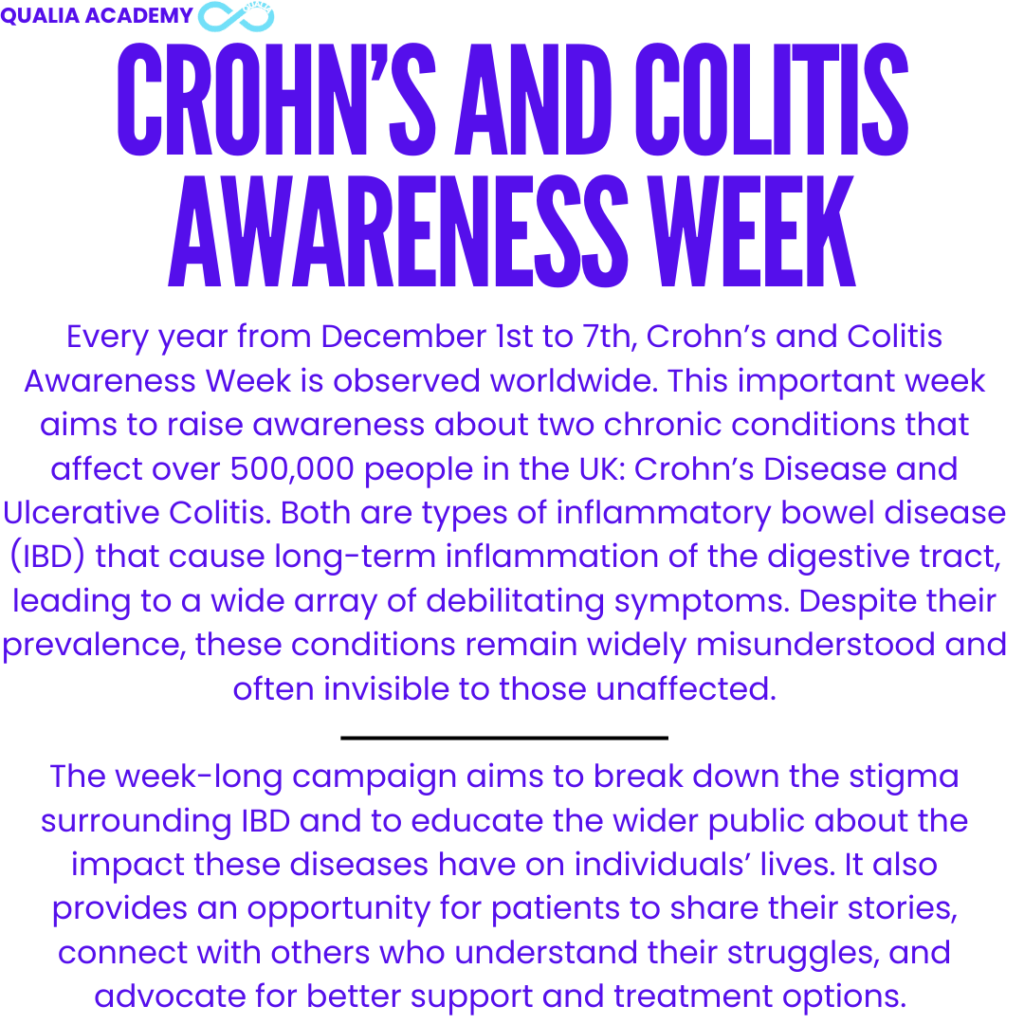Every year Crohn’s and Colitis Awareness Week is observed worldwide. This important week aims to raise awareness about two chronic conditions that affect over 500,000 people in the UK: Crohn’s Disease and Ulcerative Colitis. Both are types of inflammatory bowel disease (IBD) that cause long-term inflammation of the digestive tract, leading to a wide array of debilitating symptoms. Despite their prevalence, these conditions remain widely misunderstood and often invisible to those unaffected. Let’s delve deeper into what Crohn’s and Colitis Awareness Week is all about and why it is crucial to support those living with these hidden illnesses.

What Are Crohn’s Disease and Ulcerative Colitis?
Crohn’s Disease is a type of inflammatory bowel disease (IBD) that can affect any part of the gastrointestinal (GI) tract, from the mouth to the anus. It causes patches of inflammation and can lead to symptoms such as abdominal pain, diarrhoea, fatigue, weight loss, and malnutrition. Because Crohn’s can affect any part of the GI tract, no two cases are the same, making it difficult to diagnose and manage.
Ulcerative Colitis, on the other hand, affects only the colon (large intestine). It causes continuous inflammation and ulcers along the lining of the colon, leading to symptoms like bloody diarrhoea, abdominal discomfort, and an urgent need to use the toilet. Both conditions are long-term, with periods of flare-ups and remission, where symptoms can be intense or absent.
The Importance of Crohn’s and Colitis Awareness Week
Crohn’s and Colitis Awareness Week is more than just a time to raise awareness; it’s a chance to highlight the struggles that people with IBD face on a daily basis. Because symptoms are often invisible and can fluctuate, people with Crohn’s and Colitis frequently encounter misunderstanding or judgement. For example, someone with IBD may look healthy on the outside but be experiencing severe pain, fatigue, or discomfort internally.
The week-long campaign aims to break down the stigma surrounding IBD and to educate the wider public about the impact these diseases have on individuals’ lives. It also provides an opportunity for patients to share their stories, connect with others who understand their struggles, and advocate for better support and treatment options.
Living with Crohn’s and Colitis: The Daily Struggles
Living with Crohn’s Disease or Ulcerative Colitis is often unpredictable. Many individuals experience flare-ups, where symptoms become unbearable, requiring time off work, hospitalisations, or even surgery in severe cases. For some, even everyday activities like commuting or eating out can be daunting due to the constant fear of needing immediate access to a toilet.
The emotional toll can be just as challenging as the physical symptoms. Mental health issues, such as anxiety and depression, are common among those with IBD due to the chronic nature of the conditions and their impact on quality of life. Additionally, the sense of isolation from having an “invisible illness” can make people feel disconnected from others who may not understand their condition.
How to Get Involved During Crohn’s and Colitis Awareness Week
There are numerous ways to support Crohn’s and Colitis Awareness Week and help spread the word about these often-overlooked conditions. Here are a few ideas:
Share Stories:
If you or someone you know is living with Crohn’s or Colitis, sharing personal stories on social media or within your community can help others understand the realities of these illnesses. The more people talk about IBD, the less isolated patients will feel.
Use Social Media:
Engage with hashtags like #CrohnsAndColitisAwarenessWeek or #IBDAwareness to spread awareness and find useful resources. Social media is a powerful tool for raising visibility and can help patients connect with supportive communities.
Donate to IBD Charities:
Many UK charities, such as Crohn’s & Colitis UK, offer support, information, and funding for research into new treatments. Donations help fund crucial research and support services, enabling people with IBD to lead better lives.
Wear Purple:
In the UK, the official colour for IBD awareness is purple. Wearing purple during the week and encouraging others to do the same is a simple but effective way to raise awareness and show solidarity with those affected by Crohn’s and Colitis.
Attend Events:
Whether it’s a fundraising event, a webinar, or a local support group meeting, getting involved in community activities during the awareness week is a great way to support the cause.
Supporting Those with IBD Beyond Awareness Week
While Crohn’s and Colitis Awareness Week is vital for shining a spotlight on these conditions, support shouldn’t stop when the week ends. People living with IBD need ongoing understanding, compassion, and advocacy year-round. Employers, schools, and public spaces can take steps to make life easier for those with Crohn’s and Colitis by ensuring there are accessible toilet facilities, understanding the need for flexible working arrangements, and providing emotional support.
The Future of IBD Treatment
Though there is currently no cure for Crohn’s Disease or Ulcerative Colitis, research is progressing. Advances in medication, such as biologics and immunosuppressants, are helping more people manage their symptoms and achieve remission. Additionally, clinical trials are ongoing, exploring new treatments and therapies that could revolutionise how IBD is treated in the future.
Crohn’s and Colitis Awareness Week plays a crucial role in promoting research and ensuring that one day, these diseases may be more manageable—or even curable.
Final Thoughts
By supporting Crohn’s and Colitis Awareness Week, we can help break the stigma surrounding these invisible illnesses, provide much-needed support for those affected, and contribute to the ongoing research that seeks to improve the lives of people living with IBD. Let’s come together this December and raise awareness about Crohn’s and Colitis to build a more understanding and supportive world.









